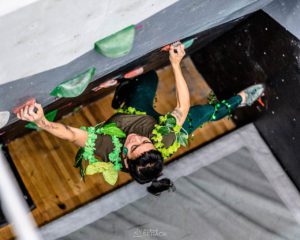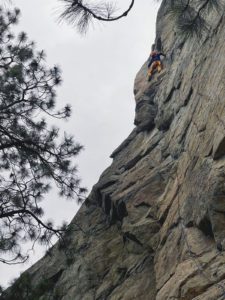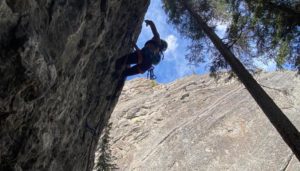Erin Corbett and Canada’s First Nonbinary Category Competition
Erin Corbett and Lauren Ray came together with Samantha Li and Alannah Yip to design a new category for this Autumn's Climb Yukon National qualifier

In the Fall of 2021, Climb Yukon held the first nonbinary category climbing competition in Canada. Erin Corbett became the category’s first and only participant in an exciting step toward gender inclusivity at a National qualifying event. Photos from the event can be found on Andrew Serack’s Facebook, Instagram, and website.

Erin Corbett
The story begins with Climb Yukon, a small, Whitehorse community founded in 1996. Originally, local climbers came together to protect their local crag. According to Corbett, climbing has only grown in Whitehorse. It has become a significant part of its community.
To that effect, Corbett only found climbing after moving to Whitehorse. Growing up, Corbett never had the opportunity to explore that interest. The expense of sports pushed Corbett to develop talents outside the outdoors. Today, Corbett works as a visual arts project coordinator when they are not climbing or snowboarding.
Upon moving to Whitehorse, Corbett immersed themselves in the outdoors. They found community and purchased climbing shoes. Soon, they were joining friends in the striking outdoor routes around Whitehorse. Their love for climbing developed quickly, and Corbett began to go on climbing trips. They learned how to trad climb and, now, with all of the climbing around Whitehorse, Corbett has become enthralled in the region’s different climbing areas and disciplines.
The long winters gave Corbett space to train and become stronger, but it was the community that brought them into competition. A friend wanted to compete but didn’t want to do it alone. Corbett decided to support them. According to Corbett, the Queer community has, and continues to flourish in Whitehorse. Climb Yukon, Lauren Ray, Samantha Li and Alannah Yip wanted to support that community in competition.

They worked with Corbett to determine how they could make the space comfortable for them. Corbett found that inclusivity did not present in all other sports. “Inclusion here is part of what makes me want to climb,” Corbett said. “If it wasn’t for that, I would have never competed.”
The Competition
Like the recent nonbinary category competition at the Crux Climbing Center in Texas, the Climb Yukon event decided to include a nonbinary gender category for their community. According to Ray, “we know the climbing community in Whitehorse has many individuals who identify across the gender spectrum. In an effort to garner a larger turnout and welcome the entire climbing community, we wanted to make sure it was as inclusive and as inviting as possible from the outset.”
Corbett considered why the first nonbinary-inclusive category competition occurred in Whitehorse as opposed to other parts of the country. Upon reflection, they think it comes down to values and size. Both Ray and Corbett reflected on the importance of inclusivity within competition as necessary for centering community in sport. Everyone’s voice has greater impact in a small community.
Still, Corbett recognized that creating this other category had its challenges. “[Climb Yukon] didn’t know if anyone was going to check off the Other box…” Corbett said. “And the Other box is an awkward box. Always a little weird.” Ray expressed her own concerns regarding confidentiality and privacy within this space. She mentioned Corbett’s perspective as instrumental toward their ultimate understanding of the event space.

Corbett found this interaction reflective of Climb Yukon’s interest in supporting those who are missing from their community. Ray spoke to this point in terms of barrier deconstruction. “I think at this stage, focusing on making community competitions more inclusive is an important first step.” Ray continued, “additional categories is one way, but also ensuring low-barrier options are available in terms of cost. We made this event free for anyone under 18, and we had a great turnout of youth.”
Looking Forward
While the first instance of a third gender category would have been exciting at any competition in Canada, the Climb Yukon event was a Nationals qualifier. This raised an interesting question about the persistence of other and nonbinary categories in qualification events as nonbinary athletes would have to choose from the female/male gender binary that is currently in use by Climbing Escalade Canada (CEC).
This is prohibitive for nonbinary climbers that do not wish to compromise their identity for the sake of competition. Corbett noted that they think there are climbers from communities the national climbing community is still not seeing. Ray said that the prioritization of performance may have a different methodology than the prioritization of community. Corbett asked, “What are other ways we can progress? What kinds of policies can we change to invest in more people?
“If we think about intersectionality, if we make something accessible to others, everyone else is going to benefit. So why not? That’s hard work, it’s not easy, but the more we make it accessible, the richer our community is going to be, and the greater the sport is going to progress.”

With the competition in the rear-view, Corbett had thoughts about the event and how advertising could go forward into the future. In the event, Corbett competed alone, but believed greater coverage could have led to a more filled out category.
To that effect, Corbett spoke on categorization in sport. “I do think representation is important. And that’s where the categories are helpful. But we also need to be aware of segregation. And segregation means not everyone’s getting equal access to resources, because of privilege. Typically, it’s men, young boys, that have access to resources first. And then you have this weird tokenization that happens thereafter.”
Corbett discussed categorization outside of gender, but noted the difficulties of that direction. Climbing’s North American National Sport Federations have oriented themselves around the International Federation of Sport Climbing and their approach to competition and their gender-binary-based form of categorization.

Featured image by Andrew Serack .


